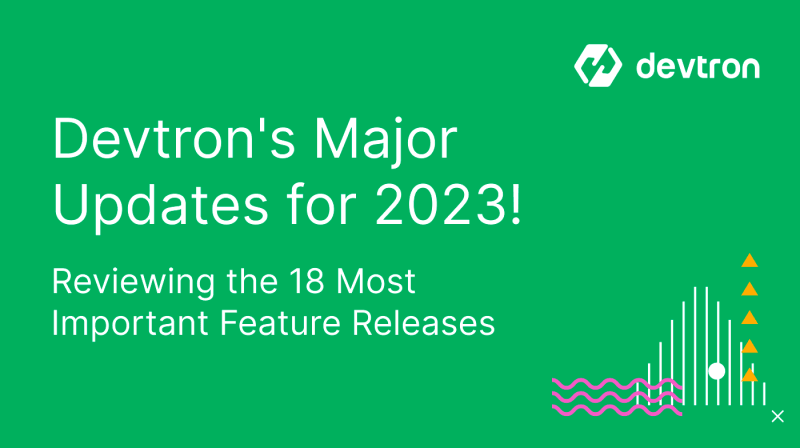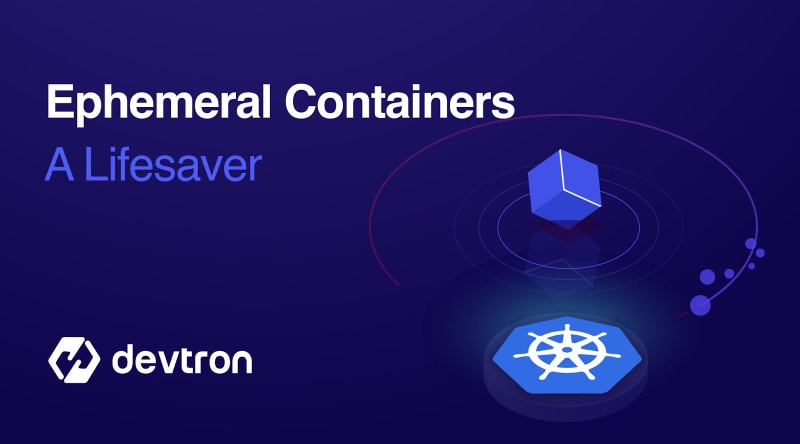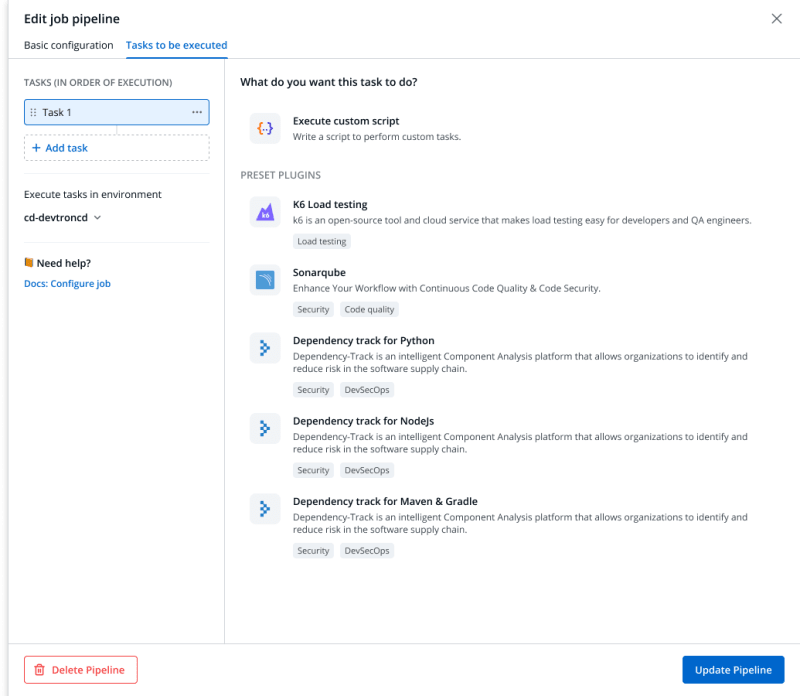At Devtron, we collaborate with our customers to define the future of the product and create the software they need to achieve their goals. From improved multi-platform support and enhanced collaboration features to dynamic management enhancements, and robust governance tools, 2023 marked a year of remarkable product growth and advancement. In this post, we discuss the major feature releases that occurred in 2023, the problems they solve, and the value they deliver.
1. Multi-platform and Multi-Cloud Support
-
Multi-platform remote build: Most companies run their software on multiple compute architectures. You might have a collection of ARM, AMD, and Intel CPUs in your environments. Running your software would require a new build for each architecture. Without Devtron, this is a time consuming process.
- Devtron's Solution: Our multi-platform remote build feature resulted in reducing build time from an hour (using older emulation methods) to six minutes for one of our application by enabling parallel build processes across different architectures using BuildX. That's a 90% decrease in build time!
Push images to multi cloud: We introduced a new Copy Container Image Plugin that empowers you to push your container images into multiple repositories, overcoming the previous limitations of single-repository use hence saving build time and costs. This caters to multi-cloud architecture, enabling repositories across various environments such as AWS, Azure, and GCP and for image promotions.
2. Collaboration Enhancements
-
Resource Catalog: Managing lots of microservices is tricky. There’s a lot of information to keep track of, like who is responsible for what, how to use the services, and who to talk to for certain approvals. Different companies keep track of this information in various ways. Some might use Google Docs, while others might use project management tools like Jira. This is important because when someone new joins the company, they need to get up to speed quickly on how everything works and what they need to know to manage these services effectively. Clear documentation and good communication are key to making sure everything runs smoothly.
- Devtron's Solution: The Resource Catalog acts like a knowledge base by providing one-stop visibility to all your resource information. You can create a catalog of any resource within Devtron, like applications, clusters, or jobs within an organization, to provide visibility over documentation, dependent microservices, impacting microservices or any relevant information that helps in better collaboration, debugging or knowledge transfer.
-
Granular Access to Resource Browser: Using
kubectlcommands to manage your Kubernetes clusters gets tiresome. Wouldn't it be great if there was a web browser-based GUI alternative that made it easier and faster to manage Kubernetes?- Devtron's Solution: Well now there is - Devtron built Advanced Kubernetes resource management with fine grained role-based access control, providing an easy to use dashboard for managing and monitoring your Kubernetes clusters and their resources. Make Devtron the first thing you install to a fresh Kubernetes cluster and it will make your life much easier.
Notifications: We've streamlined our event-based notifications for better team collaboration and approval requests. Get timely updates about build statuses, deployment outcomes, and image or config approval requests, delivered straight to your preferred platform. Set up your webhook and receive notifications wherever you want - your internal IDP, task board, Discord, Pagerduty & beyond.
3. Debugging & Developer productivity
-
Ephemeral Container: When you run application in production you want to streamline the container as much as possible for better performance and security. This is great, but it causes an issue when problems arise with your production containers. It becomes impossible to debug the production environment without having the proper tools available in those containers.
- Devtron's Solution: Ephemeral containers are a special type of short-lived container added to an existing Pod for administrative actions like debugging scenarios where 'kubectl exec' can't help. They are specialized containers that contain the exact debugging utilities required to identify the root cause of production problems. Your developers or SREs can launch these specialized containers right from Devtron and avoid the painful and time consuming process of having to recreate the problem in a different environment.
Friendly deployment and debugging in Dev-QA environment: Spanning across 2023, Devtron launched a bunch of new features that facilitate friendly (easier) deployment and debugging in Dev and QA environments. To facilitate quick, frequent changes you can; toggle your CI sources, effortlessly sync a deployed microservices from any other environments(maybe for debugging or your dev setup needs that microservice), one click hibernation in off hours, eliminating the need for tedious deletion and recreation of pipelines. Essentially, Devtron can reduce setup time in Dev or QA from hours to just a few seconds.
4. Management Enhancement
-
CD Filter: Distributing software at large scale in customer environments presents several challenges for companies. These challenges are complex and multifaceted, impacting various aspects of the software deployment and maintenance process including compatibility and integration issues, security concerns, and version and configuration management issues.
- Devtron's Solution: Take control of your deployments with our CD filter feature, enabling conditional deployment based on Common Expression Language (CEL). Shape your release channels and establish criteria-based deployments with ease, all while ensuring your images tick the boxes for environment-specific deployment.
Scoped Variables: These are global variables that can be assigned different values at different scopes or stages of an application. You can define global as well as scope-specific values based on the cluster, environment, application, or a combination of application and environment. This feature reduces the repetition of defining or updating variables and makes data maintenance easier and more secure.
Review Configuration Changes: Enables pre-deployment evaluation of configuration changes, facilitating error prevention and deployment confidence by highlighting differences and conflicts before the actual deployment process
Application Groups: Streamlines the deployment of microservices by enabling you to build and deploy multiple applications simultaneously. It’s beneficial when your microservices are interdependent, as a change in one service often triggers the need to redeploy others.
5. Capability Enhancement
OCI Push & Pull: The OCI Push builds & packages an image with configurations into a Helm chart and pushes it to a registry. It also allows packaging and delivering Helm charts to isolated clusters where direct access is not feasible(Customer-End Deployment to Air-Gapped Environments).
OCI Pull retrieves these packaged charts from any chart registry for deployment, facilitating deployments in complex or restricted environments.Jobs: Jobs provide a way to automate your repetitive tasks. You can write your custom scripts or configure preset plugins and execute them in environments of your choice. This helps in streamlining your task execution, enhancing control, simplifying configuration updates and makes execution easier with a concise run history.
6. Governance
-
Image Approval & Config Approval: Devtron's image approval and config approval features help maintain control and quality standards in deployment. This way, unauthorized or harmful alterations are prevented, enhancing your deployment's reliability.
- Image approval lets you set conditions for deployment - an image can only be deployed after it's approved by a designated person or group.
- Config approval safeguards your system configurations. Any changes to the configurations require approval for additional security.
User management through SSO groups: This feature leverages Single Sign-On (SSO) groups for user management, enhancing security and access control. It facilitates centralised user access control and enforces consistent access policies across various platforms and applications.For instance, the team can use platforms like Microsoft's Active Directory or LDAP to group users by roles. Additionally, for organisations with thousands of users, this feature eliminates the tedious task of manually adding and granting permissions to each user. Instead, it syncs directly with their active directory or SSO mechanism, automating the process of assigning user permissions.
-
Scanning with Trivy and security policies: DevSecOps isn't just a buzzword, it's an important process that helps ensure new software releases are free from known vulnerabilities when they are delivered to production. The problem with DevSecOps is that it adds extra work to the already full plate of activities that Developers are performing.
- Devtron's Solution: Instead of adding extra tools with different UIs for Developers to learn, Devtron seamlessly integrates vulnerability scanning by Trivy (and Clair) into your Devtron CI/CD pipelines and automates security checks throughout the deployment process. This makes it much easier for your Developers to comply with security policies and helps ensure a more secure application environment for your end users.
Secure ways to add clusters at Devtron: Devtron ensures heightened security while adding clusters by not relying solely on direct connections. It now enables the use of secure methods like proxy and SSH tunneling, catering to companies with stringent access policies.
Mandatory Plugin Policies: With the business clammoring for new features, Developers need to build and deliver new software as quickly as possible. The DevOps team needs to ensure that corporate security and governance standards are followed throughout the SDLC. These goals are often at odds with each other.
Devtron's Solution: Devtron makes it easy for DevOps teams to provide a Developer self-service environment where policies are enforced but developers are free to work within the guardrails that have been defined. These policies are set by super admins (typically DevOps), enforcing the usage of certain plugins (which control security and governance) in all pipelines across the organization. If not used, the pipeline trigger can be blocked, or a warning is issued accordingly. Your Developers are now free to work as fast as they need to, within the guardrails that are required by each company.
7. Plugins at Devtron
Devtron's plugins, acting as add-ons, integrate with various tools to enhance versatility. Serving as problem solvers, these plugins customize the CI pipeline, enabling new features and automating tasks. They facilitate seamless interactions with external systems and also help in delivering critical notifications during building, testing, and deploying stages. A few ready-to-use plugins include JIRA, SonarQube, Terraform, semgrep, Jenkins, GitHub, etc. These integrations allow early issue detection, comprehensive code testing, and keep pull requests up-to-date, making the CI/CD process simpler and more efficient.
Join Our Community
As we celebrate the strides we've made in cloud-native development and DevOps, the anticipation for what the new year holds is truly exhilarating. Your support means the world to us, and we invite you to be a part of our vibrant community on Discord.
If you appreciate our product, consider giving us a star on GitHub. Questions or just want to chat? Feel free to 'book a session' with us. Let's embark on this exciting journey together, pushing the boundaries of technology.
Thank you for being an integral part of our innovation story! 🚀














Top comments (0)